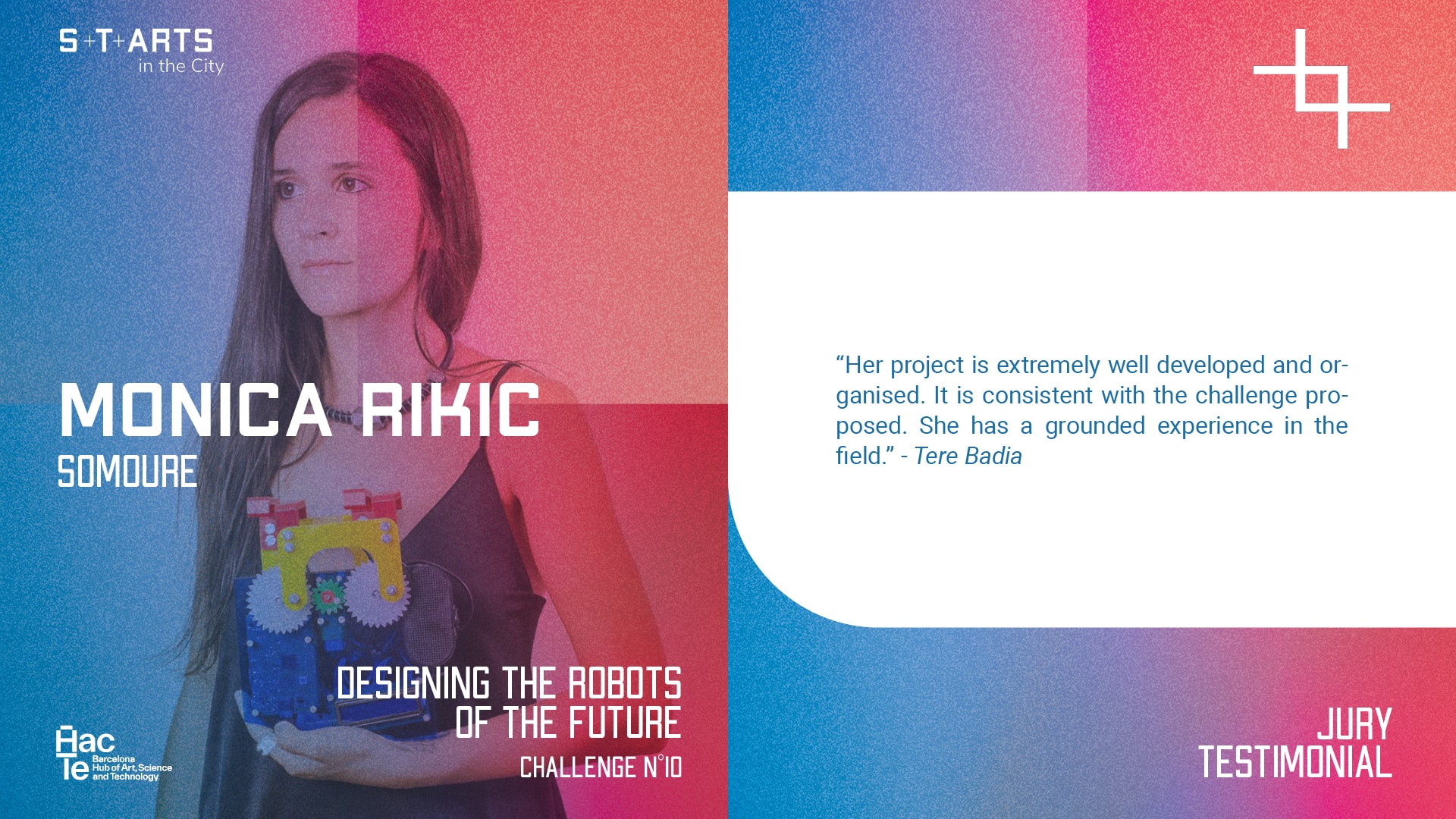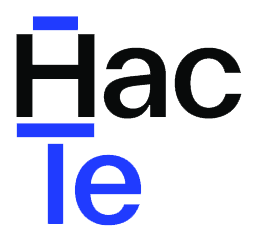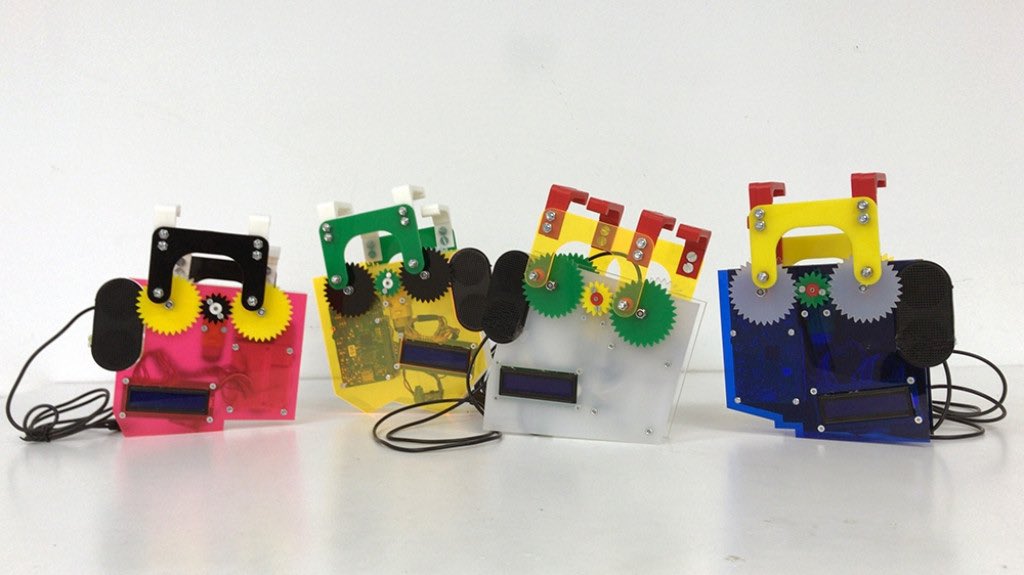Mónica Rikić – S+T+ARTS Residency at Institute of Robotics at CSIC-UPC

Mónica Rikić / Credit: Julieta Feroz
Mónica Rikić is one of the 11 winners of the S+T+ARTS Residencies that invites the artists to address the challenges that European regions face today. Within this programme, Hac Te is promoting a stay of 9 nine months at the Institute of Robotics and Industrial Informatics of the Universitat Politècnica de Catalunya (IRI CSIC-UPC), where the artist will work together with the researchers of the center on the following challenge:
+ Challenge
As a result of the aging population in Catalonia, the dependency ratio of the elderly will go from 28.9 in 2021 to 44.3 in 2040, and to 51.2 in 2070. As technology advances, robots will soon become ubiquitous in human environments. Their role will be particularly important for elderly people, providing not only a form of companionship, but also facilitating their autonomy, assisting caregivers in monitoring their well-being and accident prevention within their residences. While these advancements bring with them a number of exciting possibilities, a deep reflection is required to ensure we can safely reconfigure our lives to tackle issues such as privacy, trust, acceptance, transparency, and honest interactions. How can the arts play an active role in improving the interaction between humans and robots?
Robots will enter our life and our healthcare system to help us (and caregivers) to live better and more independently. However, several ethical concerns arise such as psychological attachment, privacy, and excess or lack of trust. A robot is a tool and to be effective it can not be seen as an intruder nor as a friend.
Science and technology research centers such as the Institute of Robotics at CSIC-UPC explore the possibilities of AI and Robotics projects for the health sector and industry. But the advancement of social robots in the practice of care, as well as European plans to incorporate AI-powered tools in healthcare, necessitate an urgent ethical consideration in order to (re)configure our practical lives in alignment with human values and rights. An arts and health project in connection with their technological developments could improve and reinforce an ethical approach in the design of the robots of the future.
This residency invites artists to collaborate with the Institute of Robotics at CSIC-UPC for the development of an artistic application or artwork that explores the interaction between patients and robots. The artist’s perspective can help in the design, implementation and evaluation of knowledge acquisition and comprehension processes undertaken by robots (thought, experience and senses).
+ Artist
Mónica Rikić is an awarded electronic artist and creative coder. Born and based in Barcelona. She is a Bachelor of Fine Arts (UB) and has a Master’s degree in Digital Arts (UPF), a Master’s degree in Contemporary Philosophy (UOC). She is a Phd Student at Network and Information Technologies doctoral program (UOC).
She has been awarded with the Catalan National Culture Award 2021 (Premi Nacional de Cultura de Catalunya 2021). Her works are part of the NewArt foundation and Colección DKV art collections.
Mónica focuses her practice on creative coding and electronics, combining them with non-digital objects to create interactive projects, robotic installations, and handcrafted electronic devices.
With her projects she has participated in different festivals around the world such Ars Electronica in Linz, Creative Tech Week in New York, Robotronica in Austalia or FILE in Brazil, among others, and has exhibited at local institutions such as the CCCB, Arts Santa Mónica, La Capella or Disseny Hub.
She has been awarded with the Catalan Culture Award 2021, and also at the Japan Media Arts Festival, AMAZE Berlin, the Margaret Guthman Musical Instrument Competition in Atlanta and with a BBVA Foundation Leonardo grant. She has participated in artistic residencies at Technoculture, Arts and Games in Montreal, European Media Artists in Resicence Exchange (EMARE) in QUT (Australia) and Hexagram (Montreal), Medialab Prado in Madrid, Platohedro in Medellin and Etopía in Zaragoza, as part of the European ARTificial Intelligence Lab program.
+ Residence Project: Somoure
Artistic research project examining the expressive conditions required for non-humanoid social robots to be accepted as trustworthy and safe companions within a collaborative healthcare environment. The overall project idea is based on the awareness that these spaces are sensitive to both consensual and accidental physical contact between humans and robots. Therefore, the whole conceptual framework navigates around the concept of ‘touch’ and the experimentation with physical and haptic communication of social robotics.
Consequently, the research has a special focus on embodied cognition and expression. The artistic experimentations will work towards finding a way to add a physical expressive layer to the robot performance, that doesn’t focus that much on utilitarian goals, while they still achieve them – and for this matter the collaboration with the scientific research groups and LEG is expected to be very close – but is designed to engage in communication ones. Through conceptual research, robot behavior experiments, handmade electronic gadgets, and critical speculative design workshops the project will try to reveal what role materials, size, shape and motion play in a robot’s self-expression in order to promote acceptance, trust and safety when interacting with humans in this type of collaborative spaces sensitive to contact.
The outcome is expected to be presented as an art installation with a main physical robotic implementation (via artistic transformation), surrounded by other devices and experiments built during the process that will serve as a nonlinear narrative of the research and experimentation process. The main platform should be able to engage with the public, expressing its personality through its behaviors and appearance. Acting a role that would inspire social acceptance and safety, it should persuade the audience to get close to it and reach out to touch it in a comfortable and friendly way.
+ Jury Testimonial
“Her project is extremely well developed and organised. It is consistent with the challenge proposed. She has a grounded experience in the field.” – Tere Badia

